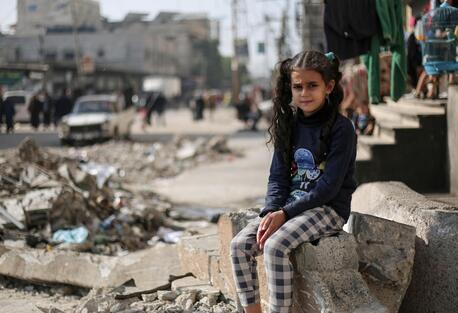
UNICEF Distributes Supplementary Food for Young Children in Gaza
UNICEF nutrition supplies are reaching malnourished children in urgent need of support in the Gaza Strip. Here's how to help.
As news of a ceasefire agreement brings hope of safety to families in the Gaza Strip and relief to hostages and their families in Israel, Gaza's markets and health systems have collapsed after 15 months of aerial bombardment, leaving Palestinian parents unable to feed their children. Nearly the entire population — 2.1 million people — are facing high levels of food insecurity.
UNICEF screens and treats children for malnutrition and distributes urgently needed supplemental food to nourish babies and young children during the critical early months and years of development.
VIDEO: See inside a UNICEF health point in Gaza City
Children in Gaza face food insecurity and lack of basic shelter
"While we continue to give baby food to children who are malnourished, the situation overall has to improve for these children," says UNICEF communication specialist Rosalia Bollen. "They need adequate shelter, where they are protected from the rain and the cold. They need a good hygiene condition so that they don't get ill and they need access to a nutritious diet."
The continued lack of basic shelter — combined with winter temperatures — poses serious threats to children. With more than a million children living in makeshift tents, and with many families displaced more than once, children face extreme risks. Newborns and children with medical conditions are particularly vulnerable.

'We are exhausted, and our children are exhausted too'
"We are exhausted, and our children are exhausted too," says Lina, holding her 10-month-old in her arms. "My son was born during the war, and here he is growing up in the war."
UNICEF Executive Director Catherine Russell applauded the ceasefire agreement and called for unimpeded humanitarian access to allow UNICEF to scale up efforts to provide nutritional and health supplies for children and their families in the Gaza Strip, along with lifesaving support in water, sanitation and hygiene (WASH); education; child protection; social protection and cash transfers, while supporting system restoration and strengthening.
Help UNICEF reach more children in need. Donate today.
HOW TO HELP
There are many ways to make a difference
War, famine, poverty, natural disasters — threats to the world's children keep coming. But UNICEF won't stop working to keep children healthy and safe.
UNICEF works in over 190 countries and territories — more places than any other children's organization. UNICEF has the world's largest humanitarian warehouse and, when disaster strikes, can get supplies almost anywhere within 72 hours. Constantly innovating, always advocating for a better world for children, UNICEF works to ensure that every child can grow up healthy, educated, protected and respected.
Would you like to help give all children the opportunity to reach their full potential? There are many ways to get involved.





